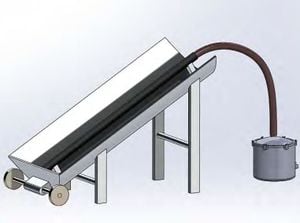

Sterilizing medical instruments from disease-carrying organisms requires both heat and pressure. This is normally accomplished by 20 minutes in an autoclave, a pressurized steam chamber. In rural areas of the developing world such equipment is not readily available. They must send their used instruments away for sterilization or even if an autoclave is available, intermittent electricity service can hold up the process and delay needed medical procedures.
Northern Arizona University has developed a solar autoclave design to address those problems. Their prototype features a reflective parabolic trough that, when placed in the sun, heats water and channels steam into a pressure cooker. It is made from widely available materials that may not be a problem to find in many developing regions.
For more information see: Full report
- Projects
- SDG01 No poverty
- SDG03 Good health and well-being
- SDG07 Affordable and clean energy
- SDG10 Reduced inequalities
- SDG11 Sustainable cities and communities
- SDG12 Responsible consumption and production
- SDG09 Industry innovation and infrastructure
- 2013
- Solar
- Health and safety
- Passive solar
- Water
- Medical equipment